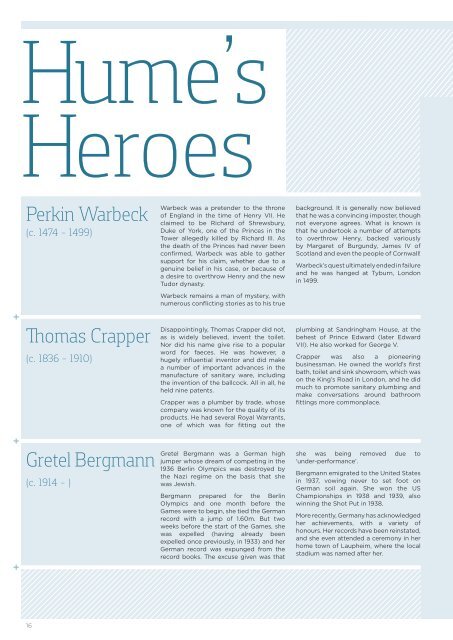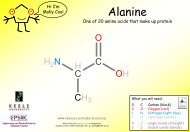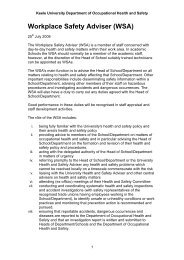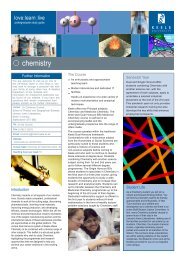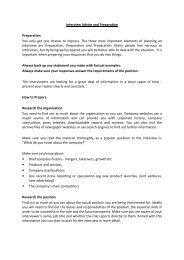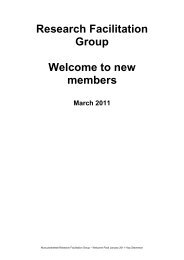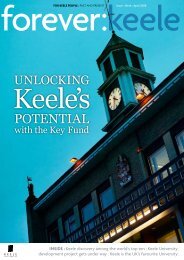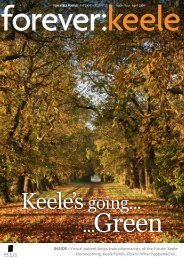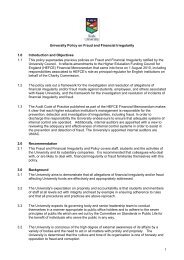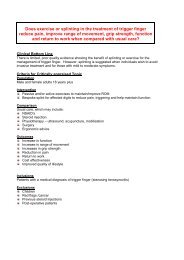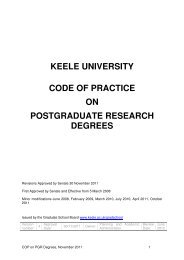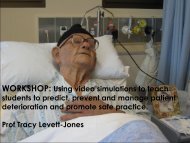FOREVER: KEELE - Keele University
FOREVER: KEELE - Keele University
FOREVER: KEELE - Keele University
Create successful ePaper yourself
Turn your PDF publications into a flip-book with our unique Google optimized e-Paper software.
Hume’s<br />
Heroes<br />
Coming up for Air<br />
“I hope you’ll do some more research and<br />
writing when you have a chance to come<br />
up for air.” Said with a twinkle in her eye,<br />
these were the last words I heard from my<br />
PhD supervisor, Marjorie Cruickshank.<br />
That was in 1982 when I was just about to<br />
take up my first teaching post in a wideability<br />
secondary school in Kent.<br />
Perkin Warbeck<br />
(c. 1474 – 1499)<br />
Thomas Crapper<br />
(c. 1836 – 1910)<br />
Gretel Bergmann<br />
(c. 1914 – )<br />
Warbeck was a pretender to the throne<br />
of England in the time of Henry VII. He<br />
claimed to be Richard of Shrewsbury,<br />
Duke of York, one of the Princes in the<br />
Tower allegedly killed by Richard III. As<br />
the death of the Princes had never been<br />
confirmed, Warbeck was able to gather<br />
support for his claim, whether due to a<br />
genuine belief in his case, or because of<br />
a desire to overthrow Henry and the new<br />
Tudor dynasty.<br />
Warbeck remains a man of mystery, with<br />
numerous conflicting stories as to his true<br />
Disappointingly, Thomas Crapper did not,<br />
as is widely believed, invent the toilet.<br />
Nor did his name give rise to a popular<br />
word for faeces. He was however, a<br />
hugely influential inventor and did make<br />
a number of important advances in the<br />
manufacture of sanitary ware, including<br />
the invention of the ballcock. All in all, he<br />
held nine patents.<br />
Crapper was a plumber by trade, whose<br />
company was known for the quality of its<br />
products. He had several Royal Warrants,<br />
one of which was for fitting out the<br />
Gretel Bergmann was a German high<br />
jumper whose dream of competing in the<br />
1936 Berlin Olympics was destroyed by<br />
the Nazi regime on the basis that she<br />
was Jewish.<br />
Bergmann prepared for the Berlin<br />
Olympics and one month before the<br />
Games were to begin, she tied the German<br />
record with a jump of 1.60m. But two<br />
weeks before the start of the Games, she<br />
was expelled (having already been<br />
expelled once previously, in 1933) and her<br />
German record was expunged from the<br />
record books. The excuse given was that<br />
background. It is generally now believed<br />
that he was a convincing imposter, though<br />
not everyone agrees. What is known is<br />
that he undertook a number of attempts<br />
to overthrow Henry, backed variously<br />
by Margaret of Burgundy, James IV of<br />
Scotland and even the people of Cornwall!<br />
Warbeck’s quest ultimately ended in failure<br />
and he was hanged at Tyburn, London<br />
in 1499.<br />
plumbing at Sandringham House, at the<br />
behest of Prince Edward (later Edward<br />
VII). He also worked for George V.<br />
Crapper was also a pioneering<br />
businessman. He owned the world’s first<br />
bath, toilet and sink showroom, which was<br />
on the King’s Road in London, and he did<br />
much to promote sanitary plumbing and<br />
make conversations around bathroom<br />
fittings more commonplace.<br />
she was being removed due to<br />
‘under-performance’.<br />
Bergmann emigrated to the United States<br />
in 1937, vowing never to set foot on<br />
German soil again. She won the US<br />
Championships in 1938 and 1939, also<br />
winning the Shot Put in 1938.<br />
More recently, Germany has acknowledged<br />
her achievements, with a variety of<br />
honours. Her records have been reinstated,<br />
and she even attended a ceremony in her<br />
home town of Laupheim, where the local<br />
stadium was named after her.<br />
What a baptism by fire that was into the<br />
teaching profession, as I tried to prepare to<br />
teach four subjects: history, local studies,<br />
religious studies and Special Needs Maths<br />
(it had been my Statistics subsidy that<br />
had got me the position!).<br />
I learned (a bit) from my mistakes, changed<br />
school twice and was not bad at my job (I<br />
even received a teaching award one year).<br />
But I found myself completely bogged<br />
down and exhausted by the preparation<br />
and piles of lower school exercise books<br />
to mark. As for research and writing, I did<br />
very little for the next ten years.<br />
Thanks to the Schools’ History Project I<br />
was at least able to introduce my students<br />
to what I most enjoyed from my research<br />
days – using historical sources to carry<br />
out investigations, evaluate evidence<br />
and form interpretations. My favourite<br />
booklet was the ‘Mystery of the Princes<br />
in the Tower’, and this gave me the idea<br />
of writing something on Perkin Warbeck<br />
who claimed to be the younger of the<br />
two princes. How serious a threat was<br />
he to King Henry VII? From my research<br />
into Perkin’s life I wrote a historical novel<br />
called Ruling Ambition, an article for the<br />
brand new BBC History Magazine and a<br />
children’s book The Boy who would be<br />
King for Short Books.<br />
I have now written about a dozen books<br />
and lots of articles for magazines and<br />
newspapers. Of special interest to me<br />
are individuals who have been left on the<br />
sidelines of history and, I feel, deserve<br />
to receive more credit. It has led to me<br />
writing on an eclectic range of subjects –<br />
almost as wide-ranging as the Foundation<br />
Year. I am particularly interested in writing<br />
fast-moving short narratives for the 12-16<br />
age range, a kind of advanced version of<br />
the old Ladybird series I enjoyed as a boy.<br />
Hooked by a BBC2 series called ‘The<br />
Murder Rooms’, I went up to Edinburgh<br />
one summer holiday to research the life<br />
of Dr Joseph Bell who I was intrigued<br />
to find had inspired Arthur Conan Doyle<br />
with the character of Sherlock Holmes.<br />
Back in my home town of Broadstairs, I<br />
paced up and down the seafront dressed<br />
in a deerstalker and sporting a Sherlock<br />
Holmes pipe, during the annual Dickens<br />
Festival in 2005.<br />
To coincide with the bicentenary of Britain<br />
abolishing the slave trade, in 2007 I wrote<br />
a short biography of Olaudah Equiano,<br />
a slave who became an abolitionist.<br />
Traditionally, William Wilberforce has<br />
received nearly all the attention because<br />
of his work in Parliament. I was interested<br />
to see what black people were doing for<br />
themselves to abolish the trade, and found<br />
that Equiano had started campaigning and<br />
touring Britain making speeches several<br />
years before Wilberforce. BBC South East<br />
Today came into school and filmed my<br />
Year 9 students reading passages from<br />
the book: that evening they were TV stars.<br />
After writing about two men I thought<br />
I ought to research a woman next, and<br />
I chose Mary Shelley. In many respects<br />
her itinerant and tragic life has been<br />
overshadowed by that of her more famous<br />
husband, the poet Percy Bysshe Shelley.<br />
One writer has recently suggested that<br />
she did not have the ability to write, and<br />
that Frankenstein was in fact the work of<br />
her husband. The book has been bought<br />
by school libraries and some English<br />
departments studying Frankenstein<br />
for GCSE.<br />
In 2010 a book to commemorate the<br />
centenary of the death of the Victorian<br />
sanitary engineer Thomas Crapper proved<br />
irresistible. Very quickly I found out that<br />
Thomas Crapper did not invent the flushing<br />
toilet as is often still assumed (Thomas<br />
Harrington did that in Queen Elizabeth<br />
I’s time). But Crapper, who is buried in<br />
the same cemetery as my grandparents<br />
in Beckenham, did make important<br />
improvements to it. Out of the research<br />
came Thomas Crapper: Lavatory Legend,<br />
fully illustrated, with a very silly multiple<br />
choice quiz at the back, together with a<br />
list of euphemisms meaning to go to the<br />
toilet. My Year 7 students spent a term of<br />
lunchtimes helping to make a giant toilet<br />
out of papier mâché and were thrilled<br />
to demonstrate it on TV on the day of<br />
the anniversary.<br />
My brother suggested I write my most<br />
recent book. On the way to work in<br />
London he spotted a paragraph in the<br />
Metro about a Jewish high-jumper called<br />
Gretel Bergmann who had finally had her<br />
record of 1936 reinstated by the German<br />
Athletics Association. Her life is a tale of<br />
injustice. Shunned by her former friends,<br />
thrown out of her sports club and banned<br />
from taking part in the Olympics, she had<br />
no choice but to go to the USA to begin<br />
a new life.<br />
Although by now I had almost thirty years’<br />
experience of teaching and had quite a<br />
stock of lessons prepared, the research<br />
for all these books had mostly to be done<br />
in the summer holidays. In term time I was<br />
increasingly being ground down by targetsetting,<br />
assessment, lesson observation<br />
after lesson observation, OFSTED – and<br />
even mock OFSTED! About three years<br />
ago I decided that I had had enough and<br />
took early retirement.<br />
Nowadays I spend most of my time<br />
travelling, and writing (mainly lighthearted)<br />
articles with a historical<br />
connection for newspapers and magazines.<br />
So, I did “come up for air” – well, eventually.<br />
I only wish I had done so sooner.<br />
Robert Hume (1978 History & Psychology)<br />
16 17


